Yesterday, Ro Khanna — the progressive Congressman from Silicon Valley — blasted out a tweet that left a lot of his prog-left fans and supporters scratching their heads.
Coinbase, a cryptocurrency exchange that allows people to trade speculative blockchain products like bitcoin, went public on NASDAQ — the first for a crypto outfit. Ro praised this development. To him it was the start of a glorious future — the surge of a democratic “inclusive” technology that gave everyone a chance to invest in the “next digital frontier” and to own a piece of Silicon Valley prosperity. The People can log on now. The People can finally get rich!

Huh? Isn’t Ro supposed to be a Bernie guy? What is he doing going spewing Silicon Valley investment tips and going all soft for a comically ridiculous libertarian technology — a “currency” that isn’t good for much other than launching speculative bubbles and superheating the planet (and maybe facilitating some dark money transfers). I mean, just one crypto currency — bitcoin — uses more energy that whole countries. And by some estimates, it consumes half the electricity of all data centers combined on the planet — that’s about the energy it takes to power half the internet, just to run a speculative bubble. If crypto coins are “inclusive” to anything, it’s our ridiculous capitalist system and it’s ever-quickening death march.
So what the hell happened to Ro? Well, nothing happened to him.
Despite his association with the Bernie movement, I think he’s always been this way. Ro might be mostly a progressive now — whatever that loose term means, anyway — but when he was first getting into politics less than a decade ago he was a Silicon Vally man.
The reason I know this is because I covered and interviewed Ro way back in 2014, during his first unsuccessful attempt to primary a liberal Democrat — from the Silicon Valley pro-business right. Back then Ro was a Silicon Valley corporate lawyer and a tech favorite. Peter Thiel, Sean Parker, Sheryl Sandberg, Marissa Mayer, Marc Andreessen, Ron Conway — all of them supported and gave him lots of money. Why? They were enthralled with Ro as someone who got Silicon Valley’s culture and its values. And Ro, in turn, promised to take their vision to Washington DC.
As he said at fundraiser hosted by Sean Parker back then:
“The premise of this campaign is quite simple. We’ve had quite brilliant people…use technology to change the world. And it’s time that we actually change politics, that Silicon Valley has the potential to do this. … It’s not just about having a tech agenda. This is about something much deeper — our values, and our ability to use those values to change Washington and the world.”
I attended one of his early campaign events. The talk he gave and the lit he passed out was all about unleashing the power of Silicon Valley and private enterprise on the world. He wanted the kids to “learn to code” their way to success. And in his book, he praised Ronald Reagan and talked in utopian terms about technology fixing society. Listening and talking to him and reading his stuff back then, it felt like he had just crawled out of a Google Labs 3D printing vat. It was kinda sad. The guy had no real politics.
He lost in 2014. But he tried again in 2016 with the same Silicon Valley innovation platform and finally won, edging out old school Democrat Mike Honda by less than 2 percent.
But then something strange happened a few years later. He pivoted hard to Bernie-style progressivism. He supported the public ownership of utilities, called for the breaking up Silicon Valley monopolies, wanted to pass a living wage, and backed Medicare For All. And even more surprising, he started coming out against America’s imperial wars — including America’s backing of fascists in Ukraine and our undeclared war in Yemen. He got a lot of shit for his new direction and even got smeared as a Putin propagandist. But it elevated his status and earned him a lot of support, as well.


How did a bland Silicon Valley business-friendly candidate switch to being one of the most progressive people in the House? I wondered about that over the years.
I think the answer is pretty mundane.
When I covered Ro in 2014, it was obvious that he was an immensely ambitious guy who wanted to hold political office — he wanted that kind of power. That was his goal. Even at that point he had already been gunning for a Congressional seat for a number of years. My read of him then was that he was more or less an empty suit. There wasn’t much to him politically — he was simply a reflection of the popular politics around him. Or to be even more precise: he donned the politics that he believed would move him up in the world. In 2014, it was Silicon Valley boosterism. In 2018, it was Bernie-style progressivism.
I thought it was a good sign that an opportunist like him switched from being a walking TED Talk to feeling the Bern.
He clearly felt that Democratic Party politics were moving in a progressive direction, and that was where his future was. So that is where he came down on things. He was probably right. And he’s done some good work, as far as DC politics go.
But Ro’s ridiculously “off brand” tweet about crypto is reminder of the ridiculous Silicon Valley libertarian side to his politics. Unleash the power of tech and the (non-monopolized) market and prosperity will follow! I bet those politics go very deep, even if he doesn’t always show them.
In the service of recovered history, I figured I’d reprint a short story I did on Ro’s Silicon Valley politics back in 2014. Enjoy!
—Yasha Levine
UPDATE: Ro Khanna responds.

Ro Khanna: Silicon Valley's own(ed) man
By Yasha Levine • February 28, 2014
SAN FRANCISCO—There's a political fight brewing in the heart of Silicon Valley, pitting old school liberal Congressman Mike Honda against a young tech-backed candidate who's gunning for the elderly man's Congressional seat.
The challenger's name is Rohit Khanna. And he's running an aggressive, cash-rich campaign to unseat Honda and represent some of the most fertile soil in Silicon Valley: California's 17th Congressional District, home to the headquarters of megacorps like Apple, eBay, Intel, Yahoo and AMD.
Ro — as his campaign likes to call him — is 37 years old, and works as an intellectual property attorney at the powerful Silicon Valley law firm Wilson Sonsini Goodrich & Rosati. He has never held elected office, and most rank and file tech workers I've talked to have never heard of him. But they soon will, because Khanna (above, left) has the blessing and financial support of their bosses and their bosses' bosses.
His campaign has so far raised about $3.2 million, and currently has $2 million — three times more the incumbent candidate he's trying to unseat. Much of that cash has come from the most powerful people in tech.
In fact, Ro's campaign contribution list reads like an unofficial Silicon Valley social register: Peter Thiel, Sean Parker, Sheryl Sandberg, Marissa Mayer, Marc Andreessen*, Ron Conway, Mark Pincus, rainmaker/venture capitalist John Doerr and hundreds of other lesser-known tech titans and financiers.
Most of these donors (as well as their husbands and wives) have maxed out their $2,600 federal individual contribution limit. Many of Ro's big name supporters are so sure he'll succeed in his primary challenge that they've maxed out their contributions to both his primary and general election campaigns.
Ro is running as a Democrat. But as you can see from the list of names, moneyed support for Ro is a multi/post-partisan affair. It's a big tent party that includes hardcore libertarians, Tea Party backers, Mitt Romney supporters, wealthy techno-Democrats, entertainment industry has beens like M.C. Hammer and new age quacks like Deepak Chopra. Hell, even anti-government venture capitalist Chamath Palihapitiya, a Senator Ted Cruz supporter who praised the recent government shutdown because it finally prevented D.C. pols from messing with the economy, is excited about electing Ro as Silicon Valley's next Congressman.
New York Magazine's Kevin Roose hung out with Ro and some of his backers, and came away stunned by the messianic fervor the candidate inspires among the normally politically agnostic Silicon Valley elite:
"In the past few months, I’ve heard maybe a dozen members of Silicon Valley’s investor class tell me, in rapturous tones, how Khanna just gets it. He gets that tech’s political influence can be much bigger than changing a few immigration laws, and he gets how much the Valley could do for the country if given strong leadership and a common platform to rally behind."
Which brings us to Ro's "strong" common platform. What exactly is it?
Ro's supporters didn't offer many specifics when interviewed by the Times or New York magazine. Rather, they describe his appeal in cultural, almost transcendental terms. Ro is a politician like few others — someone who understands that Silicon Valley is undergoing a political awakening — a coming of age. He just "gets it" and "identifies with us."
The only thing Ro's backers can agree on is that, if he wins, he'll be a reliable warrior for their interests.
"The tech community is looking for advocates who will be be really, really outspoken for tech, and Ro fits that mold... I'm hoping it's a wave of the future that continues, because it's crucial for the tech community to have a really active voice in Washington," Ron Conway, an early investor in Google and PayPal, told the New York Times.
At a $2,600-a-head fundraiser in May 2013, Napster/Facebook billionaire Sean Parker introduced Ro Khanna to a room full of other tech millionaires and billionaires as a man who can take their vision to D.C.
"Silicon Valley hasn't been properly represented at the federal level. We haven't had the kind of young, hard-driving candidate that really understands the unique issues facing Silicon Valley at a moment in time when, you know, they actually are at a series of, uhm, important political milestones and political turning points. And to a certain extent, I think we’re starting to come to a realization of our own power and of our own capability, not just as innovators and technology pioneers, but also, uhm, but also in a political sense.”
Taking the mic from Sean Parker, Ro told this room of ultra-wealthy donors that he wanted to use the values and culture of tech — their values and culture — to change the world.
“The premise of this campaign is quite simple. We’ve had quite brilliant people…use technology to change the world. And it’s time that we actually change politics, that Silicon Valley has the potential to do this. … It’s not just about having a tech agenda. This is about something much deeper — our values, and our ability to use those values to change Washington and the world."
Ro's appeal to the inflated egos of Silicon Valley billionaires — and their delusional belief in the transformative and utopian power of tech — is a bit nauseating. But it's not surprising, given the candidate's shameless embrace of tech culture and money. I mean, this is the same guy who told the New York Times that he considers himself a "tech groupie."
Still, while sucking up to Silicon Valley's inflated sense of their new power has done wonders for Ro's campaign coffers, it's hard to see how he wins against Rep Mike Honda solely on the strength of his spiritual connection to Silicon Valley's investor and executive class.
He needs something big, because it's shaping up to be tough battle. To enter the general election, Ro will need place at least second in California's newfangled "open primary" race this summer. Called a "jungle primary," it'll pit all candidates from all parties against one-another in a single race and then put the top two candidates on the general election ballot.
Current polls show Ro coming in in close third. So he's got three months to convince enough voters that he's a better Democrat than Rep. Honda. And that's no easy feat, given that the incumbent is well-liked, has the protection of the powerful House Minority Leader Nancy Pelosi and has been endorsed by President Barack Obama, Howard Dean, labor groups and a long list of other Democratic Party power players.
So what's Ro's plan? How is going to convince voters that he's radically different and better than Mike Honda?
Ro's campaign literature offers an uninspiring and cautious mix of progressive, New Democrat and Centrist Republican policies — most of them long supported by Rep. Honda. The only substantive difference seems to be in the realm of education, with Ro favoring anti-teachers' union measures like performance pay. But even there the wording is guarded and generic...
If you read his book Entrepreneurial Nation, Ro comes off as a boringly moderate Republican — someone who tisk-tisks hardline Austrian economists, Randroids and Koch groups for going over the edge in their hate of government, but praises business-minded pragmatists like President Ronald Reagan for understanding that “ideology must never trump national interests, and that our nation has a stake in helping our businesses.”
Centrism? That's not the type of stuff you'd expect from a insurgent politician facing a tough race with bad odds.
I wanted answers, specifics. So earlier this week, I went to a Ro Khanna campaign event to ask the candidate exactly what he stands for. What I discovered was shocking: he doesn't seem to know either.
Hanging with Ro on the campaign trail. February 24, 2014. Santa Clarita, California.
The event took place on Monday morning in Santa Clara, at a small high-tech medical equipment company called Access Closure. The company employs several hundred people and manufactures its products right there on site — which made it the perfect place for Ro to announce his manufacturing-centric jobs plan.
The press release said that the event would include a quick walkthrough of the facility to provide reporters and TV crews an opportunity for "footage."
I expected a bigger media crowd, but only two other reporters showed up. And we respectfully trailed behind Ro and an Access Closure company manager. Ro, tall and lanky, wore a dark suit and didn't say much as we walked through a maze of corridors and small manufacturing rooms with people in white lab coats huddling over assembly lines.
Ten minutes later we ducked into the company cafeteria, where we were greeted by with cheers and a loud ovation by a room full of Access Closure employees.
Ro got on top of a makeshift stage in front of a row of wall-mounted flatscreen TVs and delivered a 30-minute talk titled "Ro Khanna's Jobs Plan for the Bay Area's Future"...
Ro's “jobs plan” is 20% less radical than Peter Thiel's
For a Democrat pledging to "disrupt" DC politics, Ro talked a very predictable and generic game: He called for bringing advanced manufacturing jobs back to America, boosting the number of math and science teachers, increasing the participation of women in tech, supporting paid maternity leave, teaching public school kids how to code, offering tax breaks to companies that hire the longterm unemployed and increasing the federal minimum wage to $10 an hour — "we need to make work pay," he said.
Along the way, Ro referenced "research" of Koch-funded libertarian economist Tyler Cowen (apparently Ro is a fan) and proposed creating some kind of crowdsourced online lending platform to match small businesses with capital.
Ro talked a lot about small businesses. To him, entrepreneurs are the engine that will put American back on the road to prosperity. We need to unleash their potential.
He closed his remarks with arousing cliché to action: “It’s time that our government in Washington puts partisanship aside and creates the kind of partnerships that will bring prosperity to more of our families and communities. That requires a new kind of leadership with a new kind of vision. That’s what I’m offering in this campaign. And it’s what I’ll deliver in Congress. Way to shake things up!”
For all the talk of him being an aggressive disrupter, Ro is a big let down. His political vision is bland, cautious and overly conservative.
This isn't Kansas or Arizona, and Ro isn't running for Ron Paul's old congressional seat in Texas. This is the heart of the Bay Area, which has been solidly liberal and Democratic for decades. Out here, Ro comes off as a squishy moderate Republican.
None of his proposals are controversial, nor are they even minimally progressive by Bay Area standards. And they are completely in line with the views of Silicon Valley's investor and executive class.
Even a seemingly radical proposal to increase minimum wage to $10 minimum is old news in California. Just last year Governor Jerry Brown signed a law that will increase California's minimum wage to $10 by 2016. And plenty of cities up and down the state have similarly high minimum wage laws, including San Jose — which is part of the Congressional district Khanna wants to represent.
How un-radical is Ro's jobs plan? Consider that even Peter Thiel, a Ro supporter and a hardline libertarian who bankrolled Ron Paul's 2012, is in favor of raising the federal minimum wage to $12 a hour — 20% more radical than what's proposed by Ro.
More importantly, most of the ideas Ro outlined in his speech — from improving education, to helping small businesses, to increasing diversity in tech, to boosting minimum wage and bringing back manufacturing jobs — are totally in sync with Rep. Mike Honda's politics. Honda is not a pioneering or overly inspirational politician, but he's pushed and voted for similar proposals over the ten years he's spent as Congressman.
I wanted to believe that Ro's tech politics transcended Honda's tired old world ideas, but I didn't see any evidence that they existed.
So I came up to Ro after speech and asked him directly: Is there anything specific that he thinks Rep. Honda has done wrong? Any legislation, policies and/or votes?
Honda's got a decade of legislative history to choose from, so I figured Ro would at least find a couple of things he disagreed with.
I was wrong.
Ro couldn't name anything — not a single vote nor a single piece of legislation that he took issue with.
I asked Ro again and tried pressing him for something — anything — concrete. But he just kept talking vaguely about Honda's "lack of leadership" and "initiative," and that today's political challenge requires a "different skill set and expertise on the economy"...
The only specific criticism he could come up with: Mike Honda for accepting PAC money and taking campaign contributions from lobbyists — which was a strange fault to pick at, considering that Ro raised the vast majority of his campaign funds from the creme de la creme of Silicon Valley's moneyed class.
If he doesn't have a problem with the way Mike Honda's voted, then why aggressively unseat a fellow Democrat? Why go through the trouble if there's no concrete reason to do so?
It could be that Ro has plenty of things he'd do differently than Mike Honda, but doesn't want stick his neck out too far and possibly alienate voters with unfavorable positions so early in the race.
Earlier this month, Ro got creamed by a negative New York Times article after he bragged to a reporter that main difference between him and Rep. Honda is that "I wear tech groupie as a badge of honor." He then followed that up by telling the Times that he favored changing America's tax code to allow tech companies to repatriate their profits without being taxed. It's a position that would go over well with lots of tech companies, including Apple, which currently has over $100 billion in profits stashed away offshore because it doesn't want to pay taxes. Even Republican Senator John McCain called the practice "egregious and outrageous."
And maybe that's why Ro inspires such political fervor among the Silicon Valley elite: their political vision is so degraded and limited that they view a boring centrist like Ro as nothing less than Jesus, just because he wants to let them pocket their fat profits without getting taxed?
The funny thing is that even Khanna’s radical tax plan is probably not so different than Mike Honda’s. The Congressman has long supported—and taken flak for— some sort of squishy Dem compromise to allow tech companies to repatriate their profits at a special reduced tax rate. His support is not surprising given that his district is home to the some of the biggest profit hoarders in Silicon Valley: Apple has over $40 billion stashed overseas, eBay’s got $12 billion and Intel nearly $18 billion.
Even the language Khanna uses seems like its borrowed from Mike Honda.
Compare this on Khanna’s campaign website:
“We should also allow U.S. companies to bring their overseas profits back at a reduced rate if they invest a significant portion into expanding payrolls and building new manufacturing capacity.”
...to this op-ed Honda co-wrote in 2011 during pushing for a tax holiday:
“Companies with billions in cash— Oracle has more than $20 billion, Apple almost $50 billion, Cisco has $40 billion, Microsoft has $45 billion—would like to put that money to work through investments back in the company, such as dividends to shareholders, new hires, capital investments or acquisitions. Because the U.S. tax code makes bringing money back into the U.S. impractical, American companies fund their U.S. operations with debt while they expand acquisitions and expansion in Europe, Asia and other parts of the world.”
What kind of tax deal does Honda support? I asked him, but he wouldn’t commit to a hard number, only saying that he considered the 5% tax rate fielded by Silicon Valley during negotiation to be too low. But given that today’s effective corporate tax rate is somewhere around 12%—whatever number Honda supports is bound to be too low, too. Honda is an old school Democrat, remember?
So where does that leave Ro?
Good question. I went back to Khanna’s campaign to ask them but, after my earlier reporting, his press secretary had decided I was reporter non grata. “I’m not sure we’ll get a fair shake on things,” she said.
Origianlly published in Pando. Illustrations by Brad Jonas.

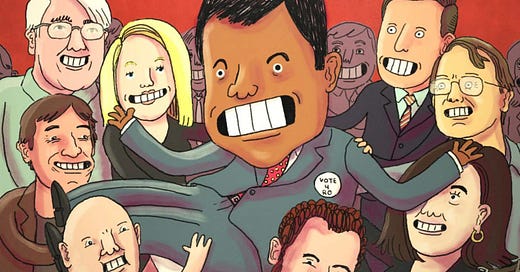

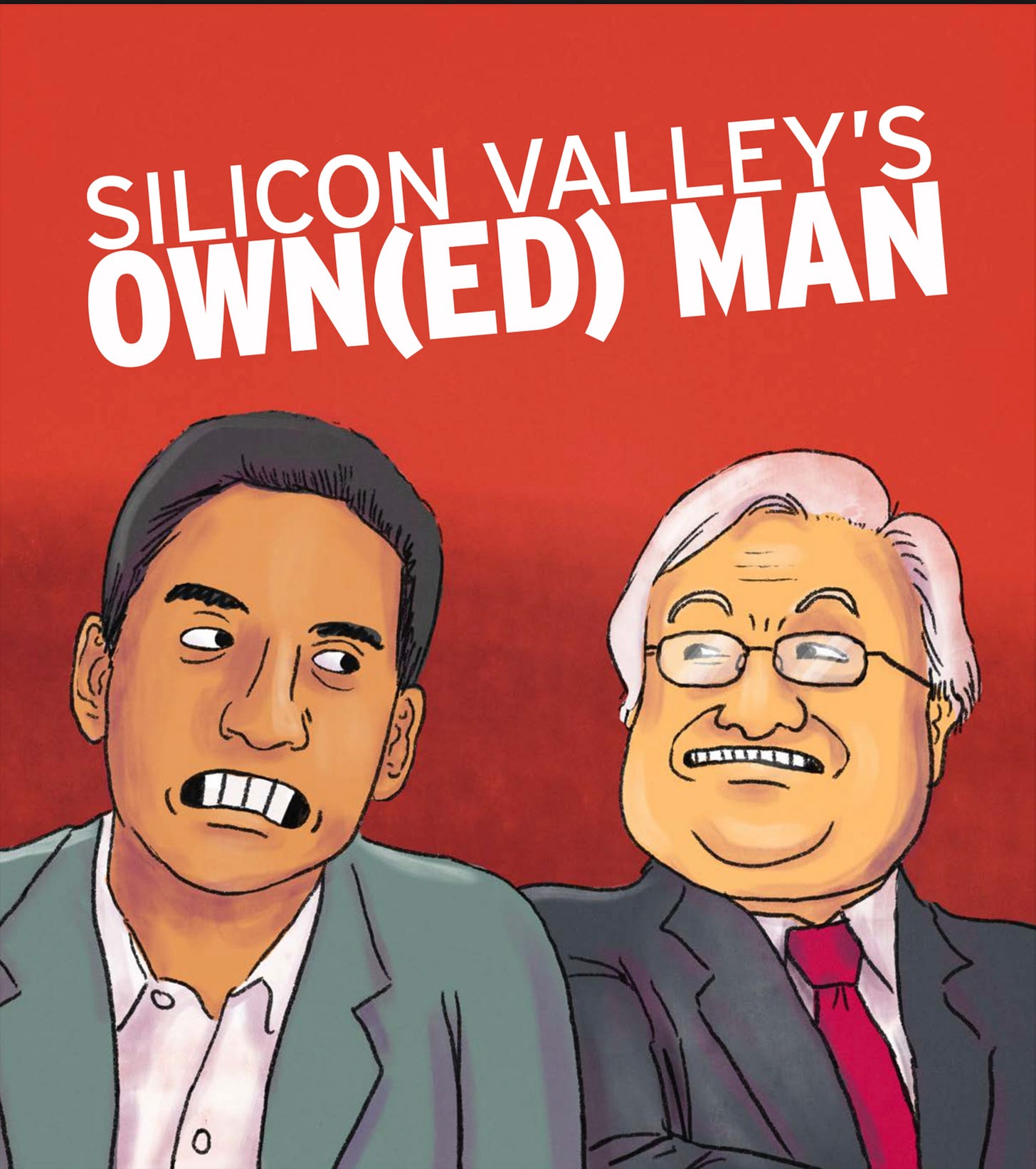

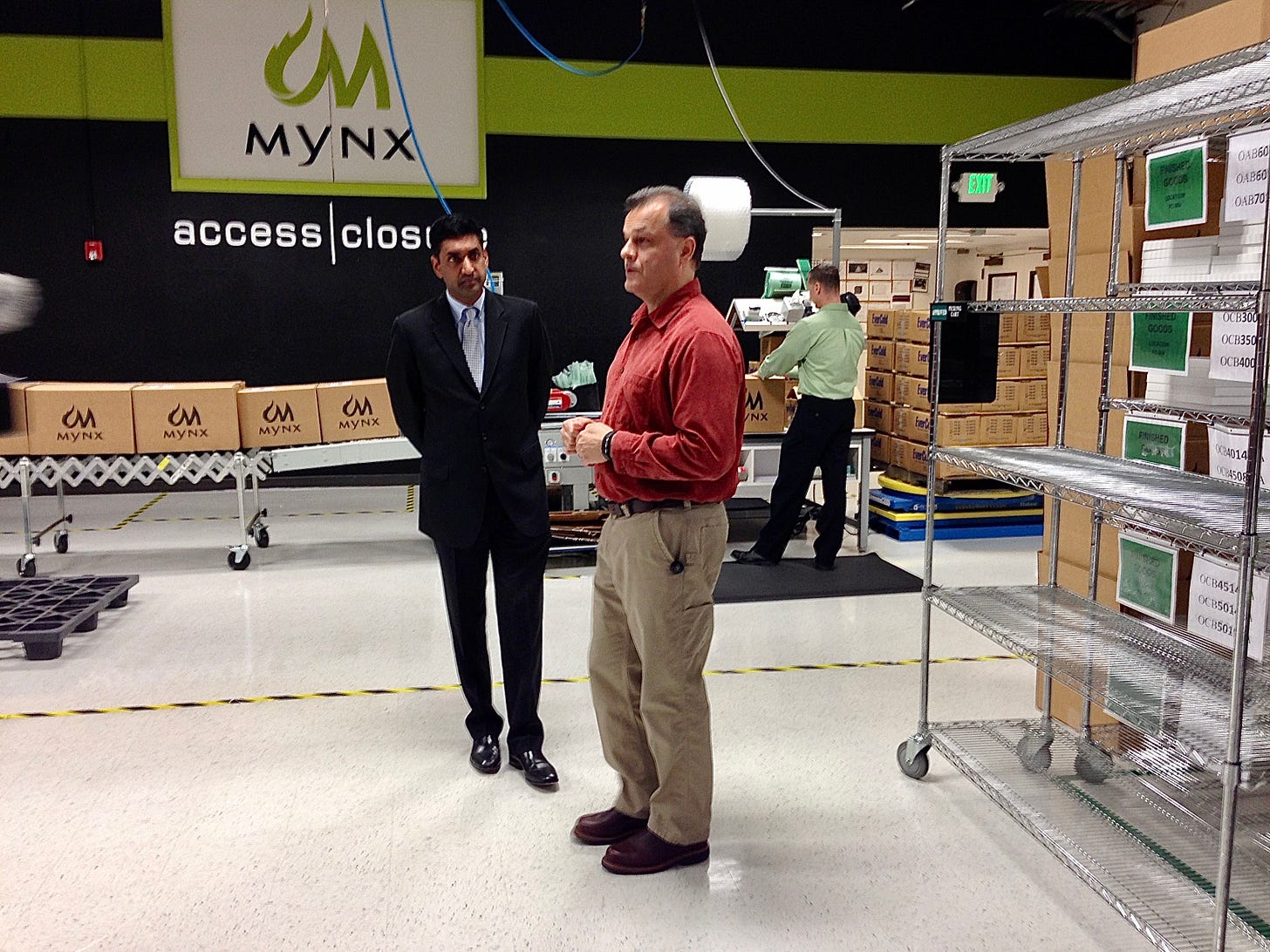
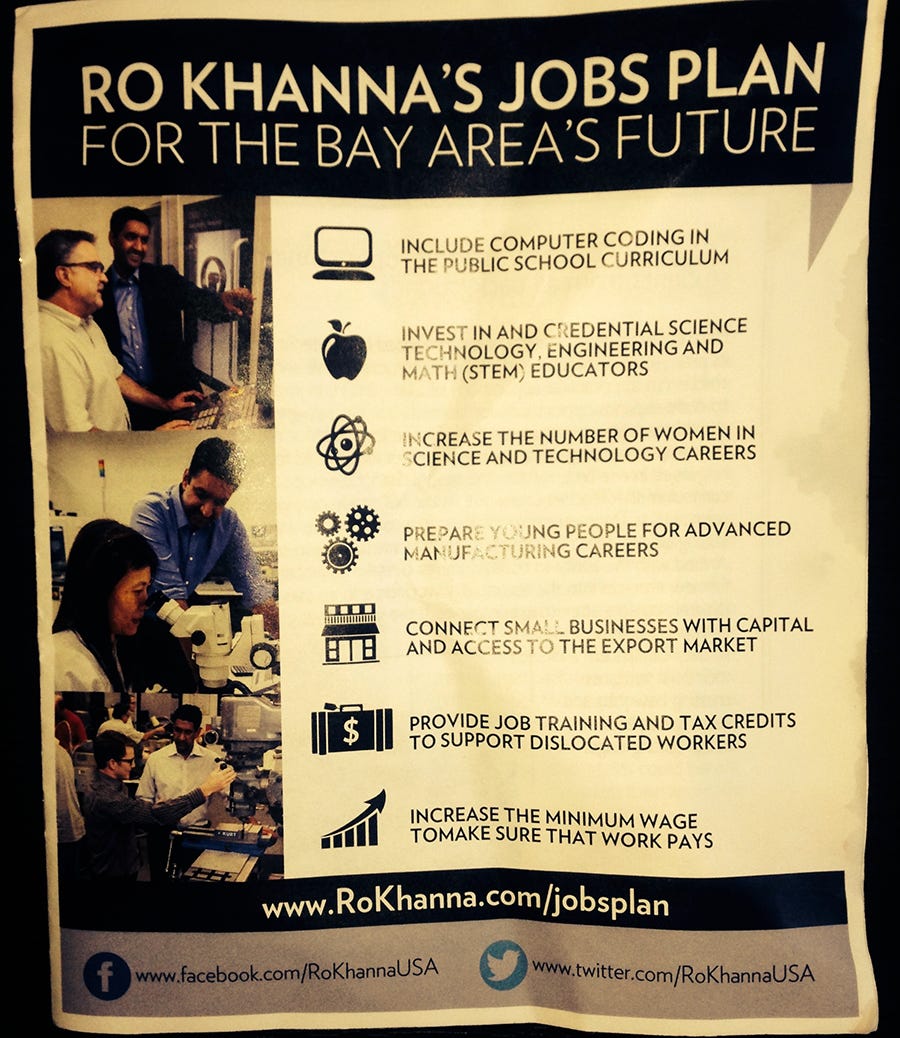
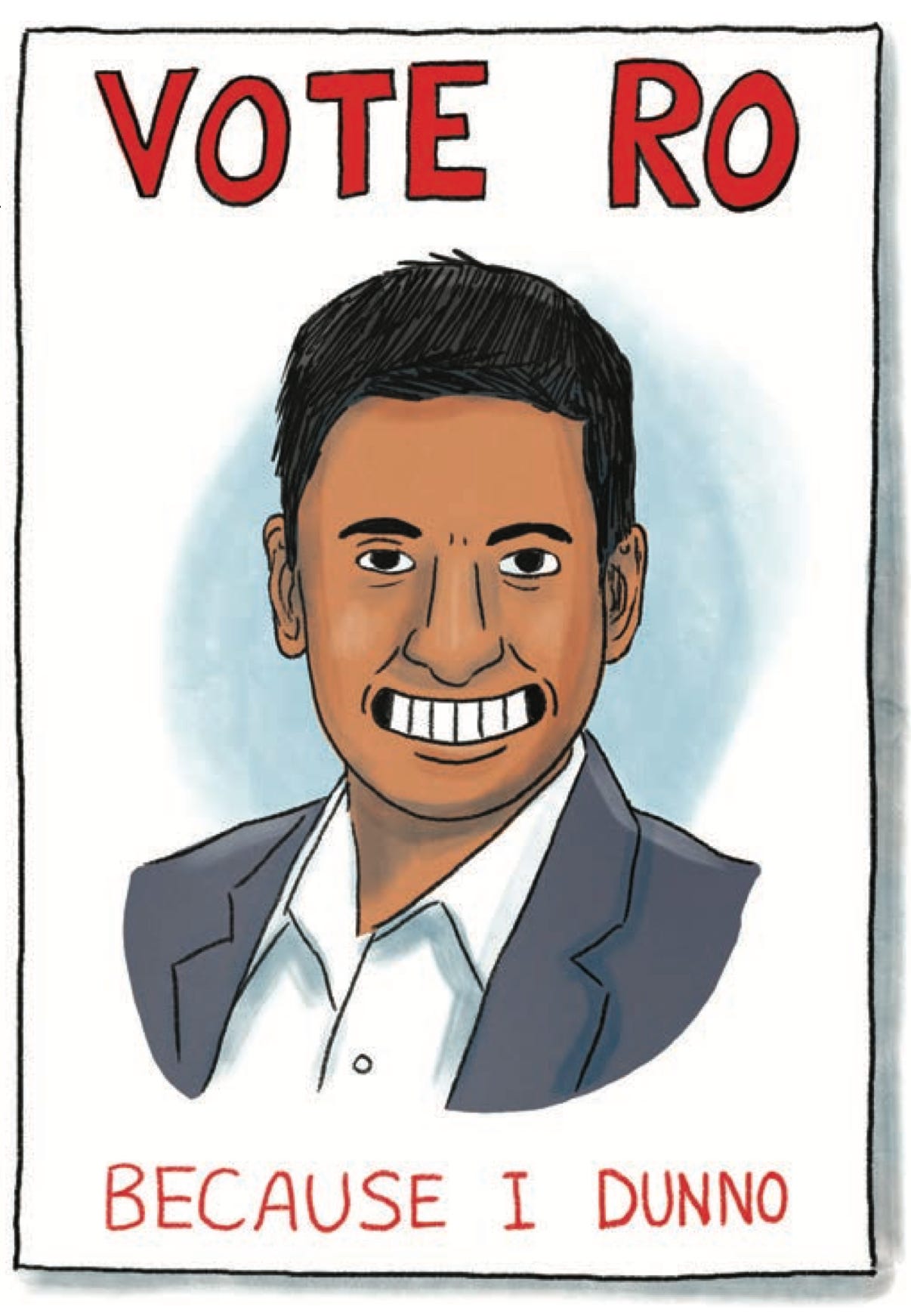
Thanks for running this Yasha! Thought I had lost my mind when I heard Ro on Katie Halper or Mehdi Hassan sounding just like Bernie — when I remembered him as a Libertarian-lite from when I was going to my pals, two Viet-American power-husbands, Honda fund-raisers. Ro’s grandpa did time with Gandhi-ji, so maybe he’s being his true self — I dunno. But that tweet about crypto is sure weird...
Hi Yasha. It IS amazing how much juice BTC uses: https://cbeci.org/